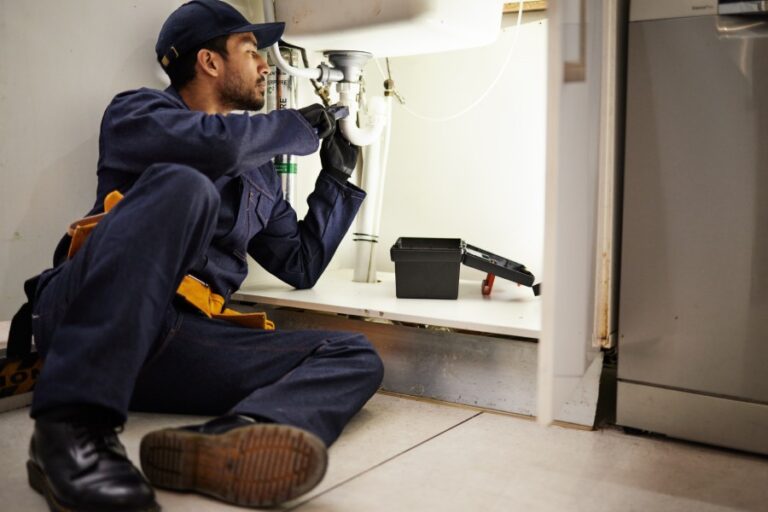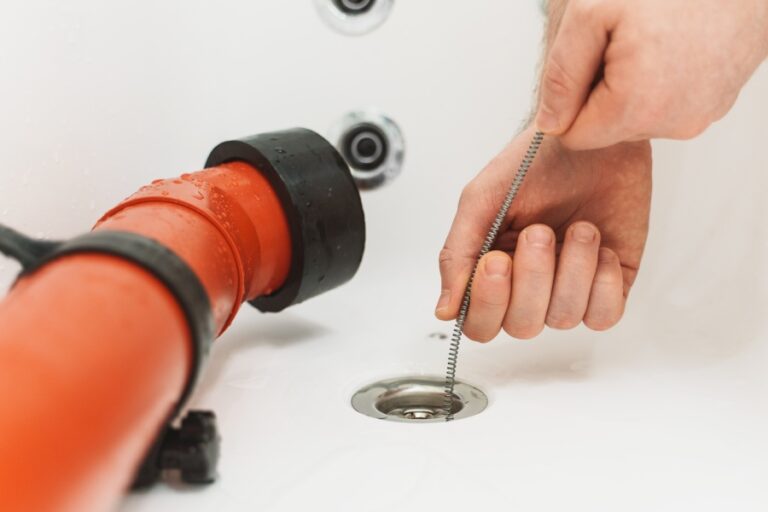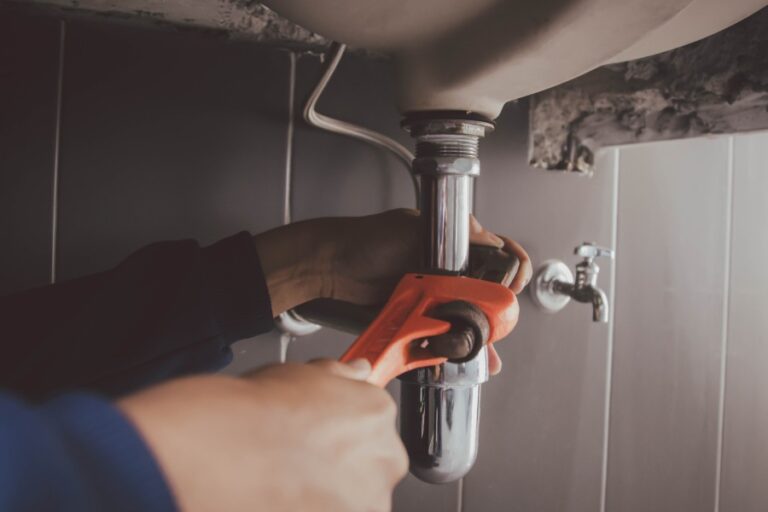Plumbing is the intricate network of pipes, fixtures, and appliances that bring water into our homes and safely remove waste. It’s a system that we often take for granted until something goes wrong.
A well-functioning plumbing system is the unsung hero of modern living, ensuring our comfort, health, and sanitation. It provides us with clean water for drinking, cooking, and bathing while efficiently carrying away wastewater and preventing the spread of diseases. Beyond these essential functions, good plumbing contributes to energy efficiency, water conservation, and even the structural integrity of our homes.
Understanding the basics of your home’s plumbing system can help you maintain it properly, prevent costly repairs, and ensure a comfortable living environment. Let’s dive into the world of pipes, valves, and fixtures that keep our homes running smoothly.

Source: shutterstock.com / Photo Contributor: PV productions
Components of a Plumbing System
Water Supply System
The water supply system is the first part of your home’s plumbing. It starts with fresh water drawn from the city’s main line. This water passes through a meter that keeps track of how much you use. From there, distribution pipes carry water first to your home structure and then to different parts of your house.
These pipes are usually made of copper or a flexible plastic called PEX. To keep your pipes and appliances safe, a pressure regulator controls how strongly the water flows. This device makes sure the water pressure stays at a safe level throughout your home.
Drainage System
After water is used, it exits your house via the drainage system. Sloped downwards, the waste pipes carry it away from sinks, toilets, and other fixtures by gravity. Vent pipes allow air into the system, aiding water flow and preventing sewer gases from entering your home.
Under each fixture is a U-shaped trap pipe, which holds water to seal out odors from the drain. This system enables your home to stay clean and odor-free, efficiently managing wastewater.
Fixtures
Fixtures are a crucial component of these systems, as they are the interfaces that allow users to access water and dispose of waste. From sinks and faucets to toilets and bathtubs all play a vital role in both functionality and the overall aesthetics of a building. Choosing the right fixtures can significantly impact water efficiency, comfort, and the user experience.
Pipes and Fittings
Pipes and fittings are the backbone of your plumbing system. Pipes come in different materials, such as copper, PVC, and PEX, each with its own benefits. Copper is strong but costly, PVC is affordable and rust-resistant, and PEX is flexible and easy to install.
There are many types of fittings, like elbows for making turns and couplings for joining pipes of the same size. Using the right pipes and fittings is important for preventing leaks and ensuring your plumbing works well.
Water Heaters
Water heaters are essential for providing hot water in homes. There are tank and tankless water heaters. Tank heaters store and continuously heat water, coming in various sizes to meet different needs. They require maintenance to flush sediment and check for corrosion.
Tankless heaters warm water on demand, offering compact size and energy efficiency but at a higher initial cost. Both types have merits, so the choice of which one you’d choose depends on your specific needs and budget.
Common Plumbing Issues
Leaky Faucets and Pipes
Leaky faucets and pipes are common plumbing problems that can waste water and cause damage. Leaks often happen because of worn-out parts, corrosion, or loose connections. You might notice water stains, hear dripping sounds, or see unexpected increases in your water bill.
Replacing a washer or tightening connections often solves faucet leaks. Pipe leaks can be more serious and might need a plumber’s help. Fixing leaks in a timely manner can save water and prevent costly damage to your home.
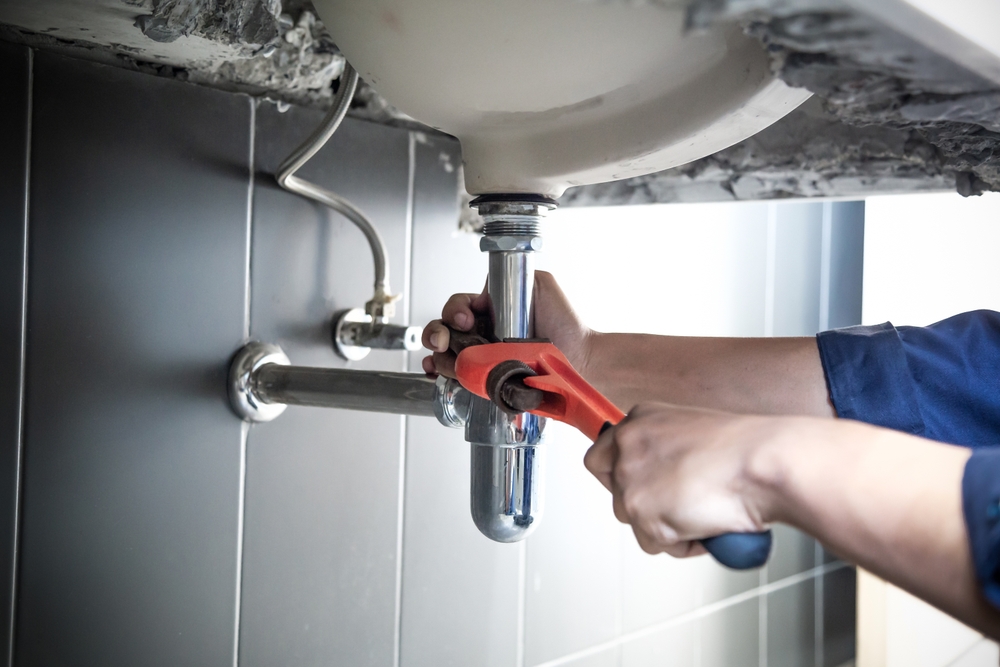
Source: shutterstock.com / Photo Contributor: Kunakorn Rassadornyindee
Clogged Drains and Toilets
Clogs in drains and toilets can disrupt your daily routine. In bathrooms, hair and soap scum are often the culprits, while kitchen sinks get clogged with food particles and grease. Toilets, on the other hand, clog when too much toilet paper or non-flushable items are flushed down the drains.
To prevent clogs, use drain covers and be careful about what goes down your drains. For minor clogs, a plunger or drain snake can often clear the blockage. If you have frequent or severe clogs, it might be time to call a plumber who can clear tough blockages and check for any underlying pipe problems.
Low Water Pressure
Low water pressure can make tasks like showering or washing dishes frustrating. Check if the problem affects all faucets or just one to determine if it’s a localized issue or a bigger problem. Low pressure can be caused by mineral buildup in pipes, leaks, or problems with the municipal water supply.
If cleaning faucet aerators or checking for visible leaks doesn’t help, a plumber can test your system and fix any faulty components. Addressing low water pressure can greatly improve your home’s plumbing performance.
Running Toilets
A running toilet might seem minor, but it can waste a lot of water and increase your bills. Common causes include a faulty flapper, a fill valve, or a chain that’s too short. You can diagnose the problem by listening to a hissing sound or using food coloring to check for leaks.
Many repairs are simple DIY jobs, like adjusting the chain or replacing the flapper. If simple fixes don’t work, it’s best to call a plumber who can quickly identify and resolve the underlying issue.
Water Heater Problems
Water heater issues can disrupt your daily routine and comfort. If you have no hot water, check the pilot light on gas heaters or the circuit breaker for electric ones. Sometimes, the thermostat might be set too low.
Regular maintenance, like annual flushing and checking the anode rod, can prevent many problems. For complex issues or if you’re unsure, it’s best to call a professional. They can safely diagnose and repair your water heater, ensuring you have reliable hot water.
Burst Pipes
Burst pipes can cause significant damage to your home, often due to freezing in cold climates or high water pressure. To prevent this, insulate pipes in cold areas, let faucets drip during freezing winter days, or turn off the main water supply if you don’t live there. Maintain proper water pressure and replace old pipes before they fail.
If a pipe bursts, turn off the main water valve immediately to stop the water flow and open faucets to drain the remaining water. Always call a plumber for emergency repair. Quick action can minimize damage and get your plumbing back to normal faster.
DIY Plumbing Tips
Basic Tools Every Homeowner Should Have
Every homeowner should have a set of basic plumbing tools, including pliers, adjustable wrenches, and screwdrivers, for simple repairs and maintenance. Specialized tools like plungers, pipe wrenches, and drain snakes are important for handling common plumbing issues.
Safety equipment such as safety goggles, waterproof gloves, and a flashlight are also essential. These basic tools can help you tackle many simple plumbing problems, saving you time and money on minor repairs.
Simple Fixes for Common Issues
Many common plumbing problems can be solved with simple DIY fixes. For a leaky faucet, you can often resolve the issue by replacing a washer or O-ring. Clogged drains can usually be cleared using a plunger or drain snake.
A running toilet can often be fixed by adjusting the chain or replacing the flapper. These simple repairs can save you the cost of a plumber’s visit. However, if these fixes don’t work, it might be time to call a professional.
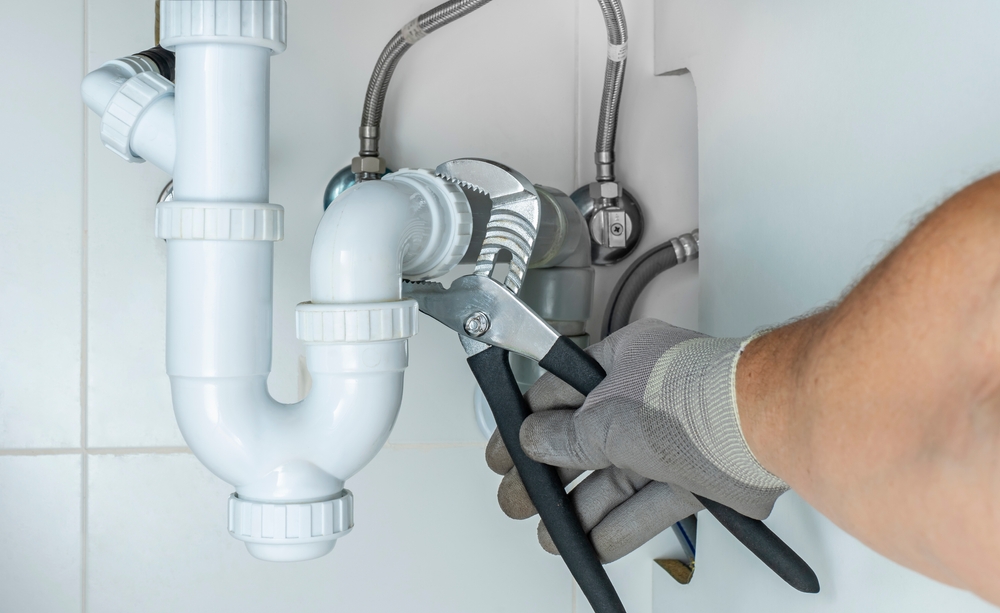
Source: shutterstock.com / Photo Contributor: rafa jodar
How to Shut off the Main Water Supply
Knowing how to shut off your home’s main water supply is crucial for every homeowner. The main shut-off valve is usually near where the water line enters, often by an exterior wall or in the basement. Familiarize yourself and your family with its location before an emergency occurs.
Practice turning the valve on and off occasionally to ensure it’s working properly. You’ll need to use the main shut-off for major leaks before big plumbing projects or if you’re leaving your home for an extended period.
When to Call a Professional
While many plumbing issues can be handled by homeowners, there are times when it’s best to call a professional. Signs of serious problems include multiple clogged drains, persistent low water pressure, or discolored water with strange odors.
Safety is paramount in plumbing work, especially when dealing with gas lines or main sewer lines. If a task makes you uncomfortable or seems potentially dangerous, it’s always better to call a professional.
Preventive Maintenance
Regular Inspections and Maintenance Tasks
Regular plumbing checks are essential for maintenance. Every month, inspect visible pipes for rust or leaks, ensure faucets and showers work well, and check drains for slow flow or noises.
Annually, have a professional plumber inspect your system to catch issues early and save money. Keep a record of all plumbing work, including dates, receipts, and maintenance, to help with future upkeep and when selling your house.
Tips for Preventing Clogs and Leaks
Preventing clogs is essential. Use strainers in sinks and showers to catch debris, and avoid pouring grease down the kitchen sink. Clean drains regularly with boiling water weekly and a baking soda-vinegar mix monthly.
Fix small leaks promptly, as even minor drips waste water and can cause bigger issues. Check for signs of leaks under sinks and address water stains on walls or ceilings immediately.
Maintaining Water Heaters
Your water heater needs annual care, including draining and flushing, to remove sediment that can hinder performance and cause damage. Set the temperature to 120°F (49°C) to balance efficiency and safety.
Regularly check and test the pressure relief valve and replace the anode rod every few years to prevent rust from occurring. Inspect for rust or leaks around the heater and consult a professional if unsure about maintenance. Proper upkeep extends the lifespan of your water heater and ensures it operates efficiently.
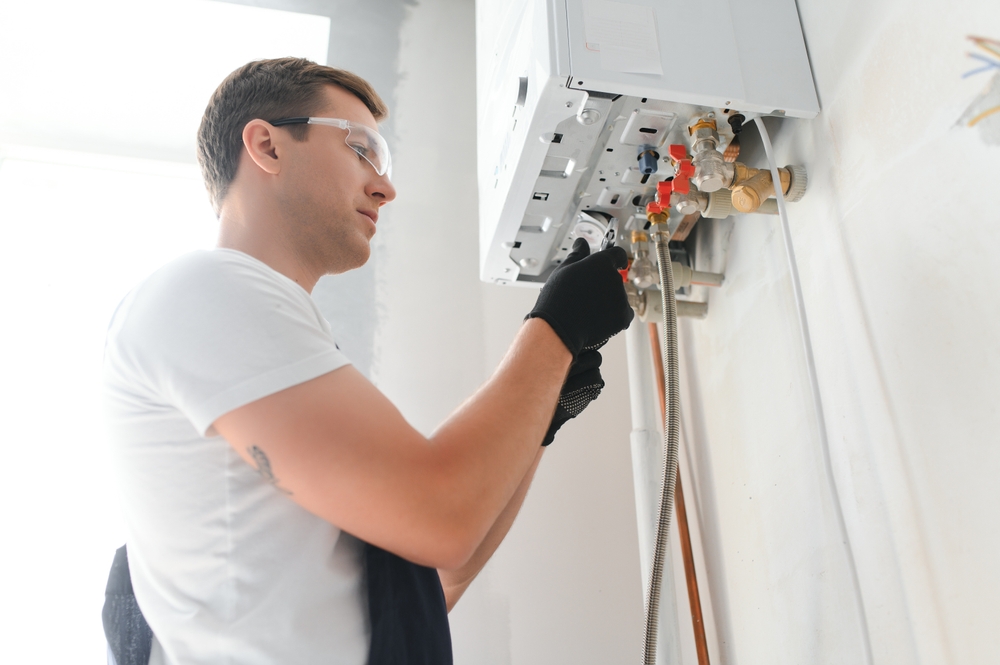
Source: shutterstock.com / Photo Contributor: Hryshchyshen Serhii
Winterizing Pipes
In cold weather, protect your pipes by wrapping visible ones with foam insulation and using heating tape in extreme cold. Let faucets drip to prevent freezing, and open cabinet doors to allow warm air to reach pipes.
Know where your main water shut-off valve is to quickly address any bursts. Outside, drain and store hoses, turn off water to outdoor faucets, and insulate them. For sprinkler systems in very cold areas, consider having a plumber blow out the water lines.
Choosing a Plumbing Professional
Factors to Consider
When hiring a plumber, check their licensing and certifications to ensure they are trained and properly qualified to perform the job. Consider their experience and expertise, as well as their response time and availability, especially for emergencies. Read online reviews and ask for past customer references to gauge their reputation.
Ensure they have insurance coverage, including liability and worker’s compensation. Finally, inquire about the technology and equipment they use, as modern tools and methods can lead to more effective and efficient repairs.
Questions to Ask Potential Plumbers
When discussing a job with a plumber, clarify their pricing structure, whether by the hour or after they finish the job and get a written estimate, including any potential extra costs. Ask if they offer a warranty on parts and labor, and understand the coverage details.
Finally, get a clear timeline for the work and inquire about factors that might cause delays to avoid misunderstandings and help with planning. Ensure they provide a detailed breakdown of costs and keep communication open throughout the project to address any issues promptly.
Understanding Plumbing Codes and Permits
Importance of Adhering to Local Plumbing Codes
Plumbing codes ensure safe and healthy water use by regulating clean water supply, waste water disposal, and temperature and pressure limits. Adhering to these codes is legally required and can prevent fines, improve insurance, and increase home value.
They also promote water conservation and cost savings by encouraging efficient fixtures and reducing the need for frequent repairs. Following these codes benefits both safety and financial stability in home plumbing.
Types of Permits Required for Plumbing Work
When building a new house, you need a permit for all the plumbing work, including water supply and waste systems. This permit requires submitting plans for approval and scheduling inspections during construction.
For home renovations, permits may be needed for significant changes, like remodeling a bathroom or kitchen. Repairs such as installing a new water heater or fixing a sewer line may also require permits. Confirm with local authorities for permit compliance.
How to Ensure Your Plumber is Code-Compliant
To ensure your plumber follows codes, verify they have a valid license and check if they have additional training in current codes. Ask them to explain the local codes relevant to your job and how they stay updated on changes.
Confirm they obtain the necessary permits and be cautious of those whose claim permits aren’t needed. Understanding the inspection process and being present during inspections can help you address any issues found.
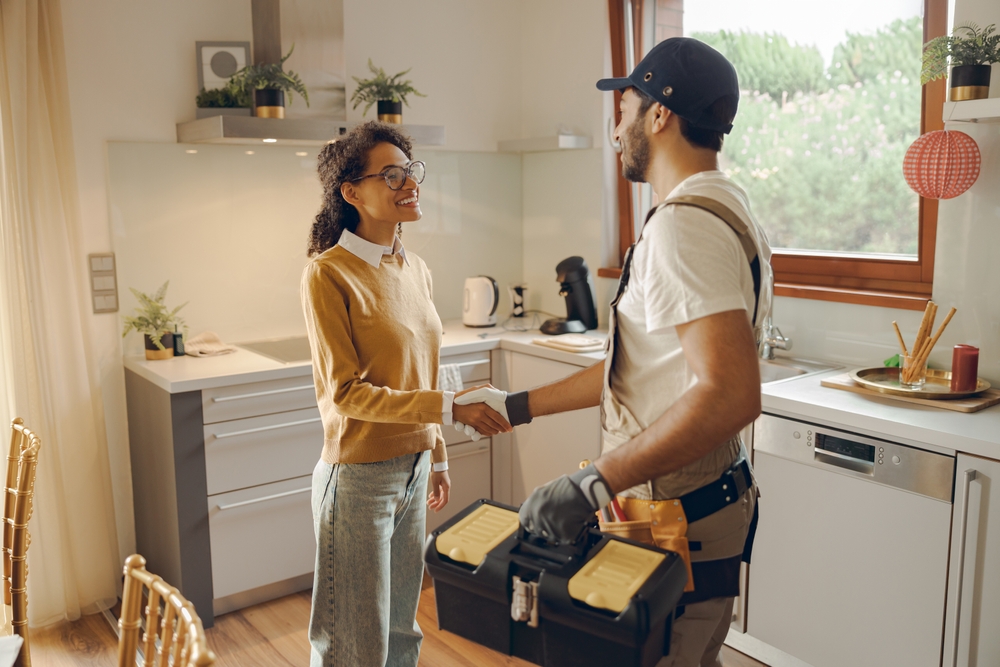
Source: shutterstock.com / Photo Contributor: Daria Voronchuk
Emergency Plumbing Situations
How to Handle Plumbing Emergencies
In a plumbing emergency, first turn off the main water supply, usually near your water meter. Soak up the water and move valuables to prevent damage, then call a plumber immediately. For clogs, try a plunger or drain snake, but avoid chemical cleaners that can damage pipes.
In case of a gas leak, evacuate the house, avoid sparks, and contact your gas company or emergency services from a safe location. Keep a list of emergency contacts handy for quick access.
Tips for Minimizing Damage
To minimize damage, if some plumbing issue occurs, first shut off the water. To do that, you’ll need to locate the main water shut-off valve and turn it off. It’s always best to show everyone in your family how to turn the main water shut-off valve in case you are not home when the issue occurs.
Always have a plunger, bucket, and wrench available, as the water can spread all over the place. Keep towels and mops at hand for quick clean-up in case you need to clean out the excess water.
To prevent plumbing issues, regularly check pipes for wear or small leaks and avoid flushing non-flushable items like wet wipes and dental floss. And for the kitchen sinks do not pour grease or oil down the kitchen drain.
Cost Considerations and Budgeting
Typical Costs for Common Plumbing Services
Knowing typical plumbing costs can help you budget. Most plumbers charge $40 to $200 per hour, depending on the job. Regular check-ups range from $150 to $300, clogged drain cleaning $100 to $250, and water heater maintenance $75 to $200.
Repairing a dripping faucet costs $100 to $200, toilet repairs $100 to $300, and pipe repairs $150 to $800+. Installation costs are higher, with new water heaters at $700 to $2,000, faucets at $150 to $350, and toilets at $200 to $500, with prices increasing for advanced features.
Tips for Staying Within Budget
- Get at least three detailed quotes for big plumbing jobs to understand fair pricing and compare costs of parts and labor separately.
- Prioritize fixing urgent issues like leaks and clogs to prevent further damage.
- Consider installing water-saving fixtures to reduce long-term costs.
- Learn to handle simple repairs yourself, such as unclogging drains and fixing leaky faucets.
- Avoid attempting complex repairs on your own.
- Keep basic tools like a plunger and pipe wrench at home for minor fixes.
Financing Options for Major Plumbing Projects
For costly plumbing projects, consider different financing options. Homeowners might use a home equity loan, which typically offers lower interest rates and provides a lump sum but uses the house as collateral.
Non-homeowners or those avoiding home equity can opt for personal loans, which have lower rates than credit cards and don’t require homeownership. Some plumbing companies offer financing, which is useful in emergencies but requires a careful comparison of terms and rates.
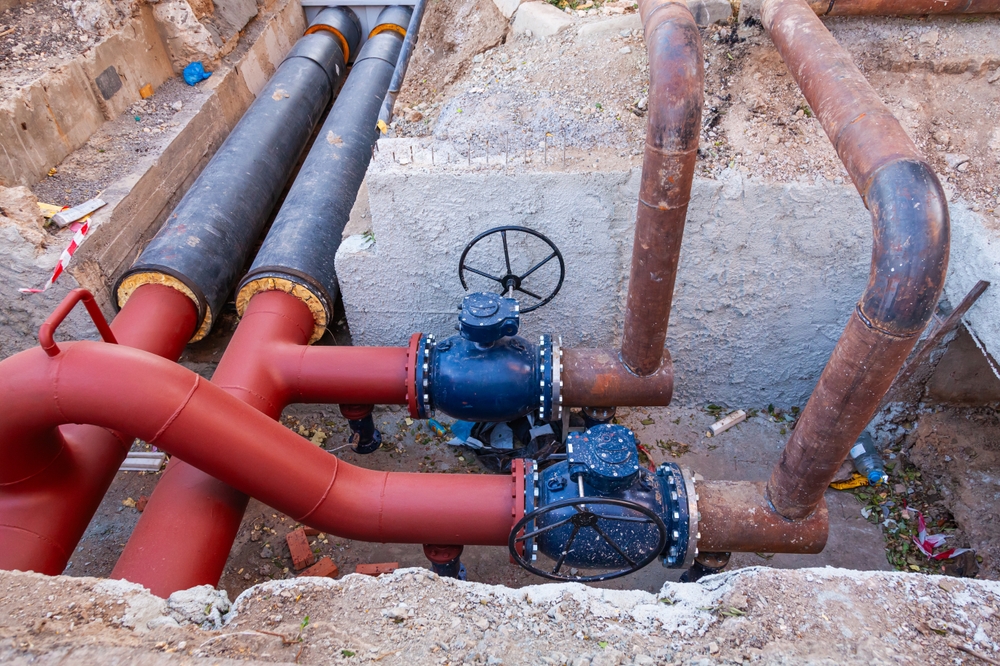
Source: shutterstock.com / Photo Contributor: ZHMURCHAK
Contingency Planning for Unexpected Expenses
Planning ahead for unexpected plumbing problems is wise; aim to save 1-3% of your home’s value annually for repairs. Ensure your home insurance covers sudden plumbing issues and consider extra coverage for sewer repairs.
A home warranty plan is another option to help with repairs or replacements but read the details carefully to understand coverage. Compare different plans to find the best one for your needs, and note that existing problems are usually not covered.
Health and Safety Considerations
Preventing Mold and Mildew from Leaks
Act quickly when dealing with leaks to prevent mold, which can grow within days. Use fans, dehumidifiers, and open windows to dry wet areas and move wet items like carpets and furniture.
Clean with soap, water, and disinfectants, wear protective gear, and seal moldy items in plastic bags for disposal. Regularly inspect your home for water stains, musty smells, and peeling paint, especially in damp areas like bathrooms and basements, to catch leaks early.
Ensuring Safe Drinking Water
Ensuring safe drinking water is crucial for health. If your water comes from a well, test it regularly using health department services or home kits to check for contaminants like bacteria and lead. Install a water filter that targets water issues and replace filters as advised.
Check your pipes; older lead pipes should be replaced with safer materials, and watch for blue-green stains from copper pipes. For drinking or cooking, use cold water to avoid higher metal concentrations.
Avoiding DIY Mistakes that Can Lead to Hazards
When tackling plumbing repairs yourself, stick to simple tasks like unclogging drains or changing faucet washers. For more complex issues, especially involving gas, always hire a professional to avoid dangerous mistakes.
Use the correct tools and learn proper techniques, as using the wrong tools or methods can damage pipes. Use chemical drain cleaners carefully, and follow local codes, and permits for safety and compliance when selling your home.
Innovations in Plumbing Technology
Latest Equipment and Techniques
The plumbing industry is evolving with new tools and methods that simplify repairs for both plumbers and homeowners. Modern pipes, such as PEX, are durable, flexible, and resistant to freezing.
Advanced tools, including tiny cameras, microphones, and heat-sensing devices, allow plumbers to detect and fix problems without the need for extensive digging or damage. These innovations save time, reduce mess, and improve overall efficiency in plumbing repairs.
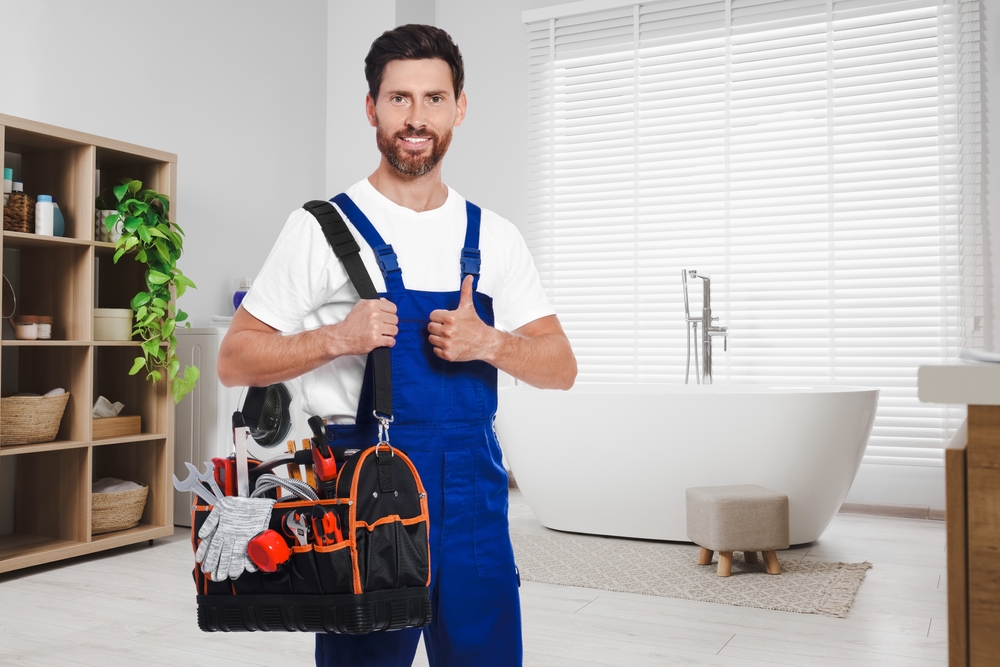
Source: shutterstock.com / Photo Contributor: New Africa
Benefits of Modern Technology in Plumbing
New plumbing technology not only fixes leaks but also saves water and energy. Modern toilets and faucets use less water efficiently, lowering bills. They also reduce waste, and advanced water heaters heat water faster and more efficiently.
Sometimes, they learn your usage patterns. Eco-friendly materials in pipes and fittings, water reuse systems, and solar water heaters further contribute to environmental sustainability and cost savings.
Smart Home Plumbing Systems
Plumbing is becoming more advanced with smart gadgets. These gadgets monitor water usage and alert us to any issues. In case of a major leak, they can even shut off the water to prevent flooding.
Voice-controlled systems help manage tasks like filling a pot or setting shower temperatures. With integration into other home technology, you can control and monitor water usage remotely via your phone. These innovations enhance convenience and help prevent potential water damage.
Frequently Asked Questions
How often should I have my home’s plumbing inspected, and why is it important?
Most experts recommend having your home’s plumbing inspected once a year. This is important because regular inspections help catch small problems before they become big, expensive issues.
For older homes, more frequent inspections might be necessary as older pipes are more prone to problems. Regular inspections prevent plumbing emergencies, save on repairs, and maintain system efficiency.
What are some effective ways to prevent drain clogs in my home?
To prevent drain clogs, install drain screens in sinks and showers to catch hair and food particles, and clean these regularly. Avoid pouring grease or oil down drains as they can harden and cause blockages; instead, let them cool and dispose of them in the trash. Weekly, run hot water through your drains to help flush out any buildup. Monthly, use natural cleaners like baking soda and vinegar to keep drains clear. These practices can significantly reduce the likelihood of clogs forming in your plumbing system.
Are products labeled as “flushable wipes” really safe to flush down the toilet?
Despite their name, products labeled as “flushable wipes” are not actually safe to flush down the toilet. Unlike toilet paper, these wipes don’t break down easily in water. They can cause clogs in your home’s pipes and in the larger sewer system.
These wipes can also cause problems at water treatment plants by creating large masses that damage equipment. To protect your plumbing and the environment, it’s best to dispose of these wipes in the trash, not the toilet. Stick to flushing only toilet paper to keep your plumbing system healthy.
Is it true that running water while using the garbage disposal helps prevent clogs?
Yes, this is actually true and not a myth. Running cold water while using your garbage disposal helps solidify any grease or oils so they can be chopped up before entering your pipes. It also helps flush food particles down the drain. Continue running water for about 15-20 seconds after turning off the disposal to ensure all debris is cleared from the pipes.
However, running water doesn’t mean you can put anything down the disposal. Avoid fibrous foods like celery or corn husks, large amounts of potato peels, coffee grounds, or non-food items.
These can still cause clogs or damage your disposal, even with running water. Combine proper water usage with mindful disposal practices for optimal performance and longevity of your garbage disposal.
Do water-saving fixtures really make a difference in water consumption?
Contrary to the myth that water-saving fixtures are ineffective, they can significantly reduce water consumption. Low-flow showerheads, dual-flush toilets, and water-efficient faucets can cut water usage by 20-60% without compromising performance.
For example, older toilets use 3.5 to 7 gallons per flush, while modern low-flow models use 1.28 gallons or less. Over time, these savings add up, benefiting both your water bill and the environment.
Locations
California
- Los Angeles
- San Diego
- San Jose
- San Francisco
- Fresno
- Sacramento
- Long Beach
- Oakland
- Bakersfield
- Anaheim
- Santa Ana
- Riverside
- Stockton
- Chula Vista
- Irvine
- Fremont
- San Bernardino
- Modesto
- Fontana
- Oxnard
- Moreno Valley
- Glendale
- Huntington Beach
- Santa Clarita
- Oceanside
- Garden Grove
- Rancho Cucamonga
- Santa Rosa
- Ontario
- Elk Grove
- Corona
- Lancaster
- Palmdale
- Hayward
- Salinas
- Pomona
- Sunnyvale
- Escondido
- Torrance
- Pasadena
- Fullerton
- Orange
- Roseville
- Visalia
- Thousand Oaks
- Concord
- Simi Valley
- Santa Clara
- Victorville
- Vallejo
- Berkeley
- El Monte
- Downey
- Costa Mesa
- Inglewood
- Carlsbad
- Fairfield
- Ventura
- Temecula
- Antioch
- Richmond
- West Covina
- Murrieta
- Norwalk
- Daly City
- Burbank
- Santa Maria
- El Cajon
- San Mateo
- Rialto
- Clovis
- Jurupa Valley
- Compton
- Vista
- Mission Viejo
- South Gate
- Vacaville
- Carson
- Hesperia
- Santa Monica
- Westminster
- Redding
- Santa Barbara
- Chico
- Newport Beach
- San Leandro
- Indio
- Tracy
- Livermore
- Baldwin Park
- Merced
- Chino
- Redwood City
- Lake Forest
- Napa
- Tustin
- Buena Park
- Mountain View
- Lakewood
- San Marcos
Texas
- Houston
- San Antonio
- Dallas
- Austin
- Fort Worth
- El Paso
- Arlington
- Corpus Christi
- Plano
- Laredo
- Lubbock
- Garland
- Irving
- Amarillo
- Grand Prairie
- Brownsville
- McKinney
- Frisco
- Pasadena
- Mesquite
- Killeen
- Carrollton
- Midland
- Waco
- Denton
- Abilene
- Odessa
- Beaumont
- Round Rock
- Richardson
- Pearland
- College Station
- Tyler
- League City
- Wichita Falls
- Allen
- San Angelo
- Edinburg
- Sugar Land
- Mission
- Conroe
- Bryan
- New Braunfels
- Pharr
Florida
- Jacksonville
- Miami
- Tampa
- Orlando
- St. Petersburg
- Hialeah
- Tallahassee
- Port St. Lucie
- Cape Coral
- Fort Lauderdale
- Pembroke Pines
- Hollywood
- Miramar
- Gainesville
- Coral Springs
- Clearwater
- Miami Gardens
- Palm Bay
- Pompano Beach
- West Palm Beach
- Lakeland
- Davie
- Miami Beach
- Plantation
- Sunrise
- Boca Raton
- Deltona
- Palm Coast
- Largo
- Melbourne
New York
- New York City
- Buffalo
- Rochester
- Yonkers
- Syracuse
- Albany
- New Rochelle
- Mount Vernon
- Schenectady
- Utica
- White Plains
- Hempstead
- Troy
- Niagara Falls
- Binghamton
- Freeport
- Valley Stream
- Long Beach
- Rome
- North Tonawanda
Pennsylvania
- Philadelphia
- Pittsburgh
- Allentown
- Erie
- Reading
- Scranton
- Bethlehem
- Lancaster
- Harrisburg
- Altoona
Illionois
- Chicago
- Aurora
- Rockford
- Joliet
- Naperville
- Springfield
- Peoria
- Elgin
- Waukegan
- Champaign
- Bloomington
- Decatur
- Evanston
- Des Plaines
- Berwyn
- Wheaton
- Belleville
Ohio
- Columbus
- Cleveland
- Cincinnati
- Toledo
- Akron
- Dayton
Georgia
- Atlanta
- Augusta
- Columbus
- Savannah
- Athens
North Carolina
- Charlotte
- Raleigh
- Greensboro
- Durham
- Winston-Salem
- Fayetteville
- Cary
- Wilmington
- High Point
Michigan
- Detroit
- Grand Rapids
- Warren
- Sterling Heights
- Ann Arbor
- Lansing
- Flint
- Dearborn
- Livonia
- Troy
New Jersey
- Newark
- Jersey City
- Paterson
- Elizabeth
- Edison
- Woodbridge
- Lakewood
- Toms River
- Hamilton
- Trenton
Virginia
- Virginia Beach
- Norfolk
- Chesapeake
- Richmond
- Newport News
- Alexandria
- Hampton
- Roanoke
- Portsmouth
- Suffolk
Washington
- Seattle
- Spokane
- Tacoma
- Vancouver
- Bellevue
- Kent
- Everett
- Renton
- Federal Way
- Yakima
Massachusetts
- Boston
- Worcester
- Springfield
- Lowell
- Cambridge
- New Bedford
- Brockton
- Quincy
- Lynn
- Fall River
Arizona
- Phoenix
- Tucson
- Mesa
- Chandler
- Glendale
- Scottsdale
- Gilbert
- Tempe
- Peoria
- Surprise
Tennessee
- Nashville
- Memphis
- Knoxville
- Chattanooga
- Clarksville
- Murfreesboro
- Franklin
- Jackson
- Johnson City
- Bartlett
Indiana
- Indianapolis
- Fort Wayne
- Evansville
- South Bend
- Carmel
- Fishers
- Bloomington
- Hammond
- Gary
- Lafayette
Missouri
- Kansas City
- St. Louis
- Springfield
- Columbia
- Independence
- Lee’s Summit
- O’Fallon
- St. Joseph
- St. Charles
- St. Peters
Maryland
- Baltimore
- Columbia
- Germantown
- Silver Spring
- Waldorf
- Glen Burnie
- Ellicott City
- Frederick
- Dundalk
- Rockville
Wisconsin
- Milwaukee
- Madison
- Green Bay
- Kenosha
- Racine
- Appleton
- Waukesha
- Oshkosh
- Eau Claire
- Janesville
Colorado
- Denver
- Colorado Springs
- Aurora
- Fort Collins
- Lakewood
- Thornton
- Arvada
- Westminster
- Pueblo
- Centennial
Minnesota
- Minneapolis
- St. Paul
- Rochester
- Duluth
- Bloomington
- Brooklyn Park
- Plymouth
- St. Cloud
- Eagan
- Woodbury
South Carolina
- Columbia
- Charleston
- North Charleston
- Mount Pleasant
- Rock Hill
- Greenville
- Summerville
- Sumter
- Goose Creek
- Hilton Head Island
Alabama
- Birmingham
- Montgomery
- Mobile
- Huntsville
- Tuscaloosa
Louisiana
- New Orleans
- Baton Rouge
- Shreveport
- Lafayette
- Lake Charles
Kentucky
- Louisville
- Lexington
- Bowling Green
- Owensboro
- Covington
Oregon
- Portland
- Salem
- Eugene
- Gresham
- Hillsboro
Oklahoma
- Oklahoma City
- Tulsa
- Norman
- Broken Arrow
- Edmond
Connecticut
- Bridgeport
- New Haven
- Stamford
- Hartford
- Waterbury
Iowa
- Des Moines
- Cedar Rapids
- Davenport
- Sioux City
- Iowa City
Mississippi
- Jackson
- Gulfport
- Southaven
- Hattiesburg
- Biloxi
Arkansas
- Little Rock
- Fort Smith
- Fayetteville
- Springdale
- Jonesboro
Utah
- Salt Lake City
- West Valley City
- Provo
- West Jordan
- Orem
Nevada
- Las Vegas
- Henderson
- Reno
- North Las Vegas
- Sparks
Kansas
- Wichita
- Overland Park
- Kansas City
- Olathe
- Topeka
New Mexico
- Albuquerque
- Las Cruces
- Rio Rancho
- Santa Fe
- Roswell
Nebraska
- Omaha
- Lincoln
- Bellevue
- Grand Island
- Kearney
West Virginia
- Charleston
- Huntington
- Parkersburg
- Morgantown
- Wheeling
Idaho
- Boise
- Meridian
- Nampa
- Idaho Falls
- Pocatello
Hawaii
- Honolulu
- Pearl City
- Hilo
- Kailua
- Waipahu
Maine
- Portland
- Lewiston
- Bangor
- South Portland
- Auburn
New Hampshire
- Manchester
- Nashua
- Concord
- Derry
- Dover
Rhode Island
- Providence
- Warwick
- Cranston
- Pawtucket
- East Providence
Montana
- Billings
- Missoula
- Great Falls
- Bozeman
- Butte
Delaware
- Wilmington
- Dover
- Newark
- Middletown
- Smyrna
South Dakota
- Sioux Falls
- Rapid City
- Aberdeen
- Brookings
- Watertown
North Dakota
- Fargo
- Bismarck
- Grand Forks
- Minot
- West Fargo
Alaska
- Anchorage
- Fairbanks
Vermont
- Burlington
- South Burlington
Wyoming
- Cheyenne
- Casper
Recent Blog Posts
Plumbing Problems
Plumbing issues are an inevitable part of homeownership, often striking at the most inconvenient times. From the sudden shock of…
How to Use a Plumbing Snake
When faced with a clogged drain, many homeowners feel frustration and urgency. Clogs can disrupt daily routines, making it essential…
What to Know About Plumbing
When it comes to maintaining a home, few systems are as crucial yet often overlooked as plumbing. The network of…

